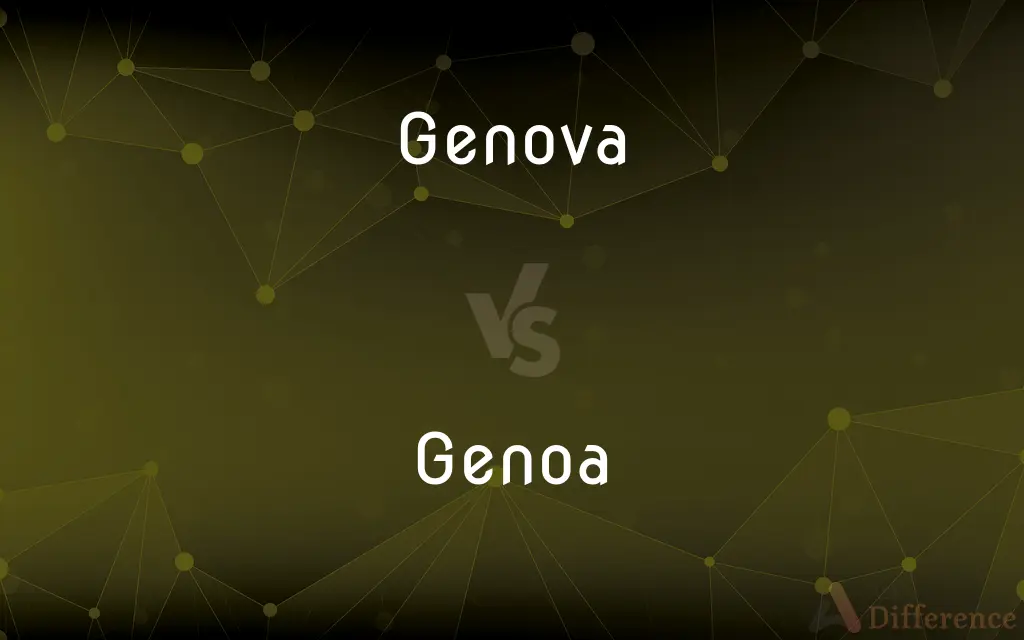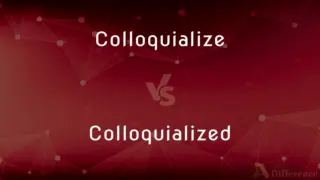Genova vs. Genoa — What's the Difference?
By Maham Liaqat & Fiza Rafique — Updated on March 18, 2024
Genova and Genoa refer to the same Italian city, known for its rich history and significant port. "Genova" is the Italian spelling, while "Genoa" is the English version.

Difference Between Genova and Genoa
Table of Contents
ADVERTISEMENT
Key Differences
Genova, the Italian name for the city, reflects its local heritage and linguistic roots. Situated in the Liguria region, Genova is famed for its pivotal role in maritime trade, especially during the medieval period as part of the powerful Maritime Republics. Genoa, on the other hand, is the name used in English-speaking contexts and is recognized internationally. This version is often encountered in historical texts, travel literature, and global discussions.
Both names evoke images of the city's sprawling port, one of the busiest in the Mediterranean, and its intricate web of narrow streets known as "caruggi" that lead to hidden squares and Renaissance buildings. Despite the difference in spelling, both terms refer to the same city, renowned for its significant contributions to maritime history, including being the birthplace of Christopher Columbus.
The choice between Genova and Genoa can depend on the linguistic or cultural context of the discussion. When speaking Italian or referring to the city in a local context, "Genova" is preferred. In contrast, "Genoa" is more commonly used in English and in international settings. This dual naming reflects the broader phenomenon of cities and places having different names in different languages, contributing to the rich tapestry of global cultural diversity.
In academic and historical research, the use of Genova or Genoa can also signal the specific focus or perspective of the study, with "Genova" potentially indicating a more localized, Italian-centric approach, while "Genoa" might suggest a broader, perhaps more international scope. Regardless of the term used, the city in question remains a vibrant cultural and economic center, with a deep history that continues to attract visitors and scholars from around the world.
Comparison Chart
Language
Italian
English
ADVERTISEMENT
Context
Used in Italian-speaking contexts and locally in Italy
Used in English-speaking contexts and internationally
Historical Significance
Same for both; a key maritime power and birthplace of Christopher Columbus
Same for both; a key maritime power and birthplace of Christopher Columbus
Cultural Implications
Reflects local heritage and linguistic traditions
Reflects global recognition and English linguistic adaptation
Usage
Preferred in local and Italian-centric discussions
Commonly used in international and English-language discussions
Compare with Definitions
Genova
The Italian name for the city known for its significant port and rich maritime history.
Genova's historic center is a UNESCO World Heritage Site.
Genoa
The English version of the name for the Italian city, used in international contexts.
Genoa is a popular destination for tourists exploring the Ligurian coast.
Genova
The name used by residents and in Italian literature.
In Italian literature, the city is always referred to as Genova.
Genoa
Appears in English-language texts and discussions about Italy.
The history of Genoa is integral to understanding the Mediterranean's maritime past.
Genova
Reflects local linguistic and cultural identity.
The Genova Film Festival showcases Italian and international cinema.
Genoa
Used by English speakers and in global discussions.
The Port of Genoa is one of the busiest in the Mediterranean Sea.
Genova
Associated with specific cultural and historical references within Italy.
Genova played a crucial role in Italy's maritime history.
Genoa
Reflects the English linguistic adaptation of the Italian city's name.
Many English-speaking historians write about the Republic of Genoa.
Genova
Used in Italian and in contexts emphasizing local culture and heritage.
Genova is famous for its pesto sauce.
Genoa
Often found in travel literature and international guides.
Travel guides often list Genoa's aquarium as a must-visit attraction.
Genova
A seaport in northwestern Italy; provincial capital of Liguria
Genoa
Genoa ( JEN-oh-ə; Italian: Genova [ˈdʒɛːnova] (listen); Ligurian: Zêna [ˈzeːna]; English, historically, and Latin: Genua) is the capital of the Italian region of Liguria and the sixth-largest city in Italy. In 2015, 594,733 people lived within the city's administrative limits.
Genoa
(Nautical) A jib whose leech extends aft of the mast. Also called genoa jib.
Genoa
(nautical) A staysail that resembles a jib but extends aft beyond the mast.
Genoa
A seaport in northwestern Italy; provincial capital of Liguria
Common Curiosities
What are the main attractions in Genova/Genoa?
Key attractions include the historic center, the bustling port, the Aquarium of Genoa, and the intricate network of narrow streets known as "caruggi."
Has the city's name always been Genova in Italian and Genoa in English?
Yes, "Genova" has always been the Italian name, while "Genoa" is the longstanding English adaptation, reflecting the common practice of anglicizing place names.
Do residents prefer one name over the other?
Residents, speaking Italian, predominantly use "Genova," reflecting the local language and culture.
How does the naming affect cultural or historical studies of the city?
The use of "Genova" or "Genoa" might reflect the focus of the study, with "Genova" possibly indicating a more local, Italian perspective and "Genoa" a broader, international viewpoint.
Why does the city have two different names?
The city has two names due to linguistic differences between Italian and English, with "Genova" being the Italian name and "Genoa" the English adaptation.
Are there any significant cultural differences implied by the two names?
The names themselves don't imply cultural differences but using "Genova" or "Genoa" can indicate the speaker's cultural or linguistic background.
Can both names be used interchangeably?
While both names refer to the same city, their use often depends on the language or context of the conversation, with "Genova" preferred in Italian settings and "Genoa" in English.
Is there any difference in visiting Genova or Genoa?
There is no difference in terms of the destination; both names refer to the same city. The choice of name typically depends on the linguistic context.
How do the city's inhabitants identify with its name?
Inhabitants identify with "Genova," aligning with their Italian heritage and linguistic identity, though they recognize "Genoa" as the international version of the city's name.
In international maritime history, is the city referred to as Genova or Genoa?
In English-language texts and international discussions, the city is often referred to as "Genoa," especially when discussing its historical maritime significance.
Share Your Discovery

Previous Comparison
Grim vs. Smile
Next Comparison
Colloquialize vs. ColloquializedAuthor Spotlight
Written by
Maham LiaqatCo-written by
Fiza RafiqueFiza Rafique is a skilled content writer at AskDifference.com, where she meticulously refines and enhances written pieces. Drawing from her vast editorial expertise, Fiza ensures clarity, accuracy, and precision in every article. Passionate about language, she continually seeks to elevate the quality of content for readers worldwide.















































